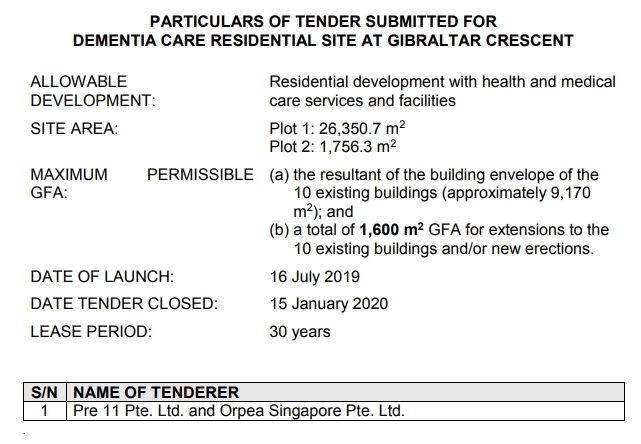The Urban Redevelopment Authority (URA) announced on Jan 15 that on behalf of the Ministry of Health (MOH), it has closed the dementia care village tender for the site at Gibraltar Crescent.
The dementia care village tender was launched for sale via the Concept and Price Revenue Tender approach on 16 July 2019.
URA said that dementia care village tender submission received under this approach got only one bid, and the envelope containing the concept proposal was opened for evaluation.
Table of Contents
The dementia care village tender is part of ongoing efforts to improve the quality of life of persons with dementia and broaden the care and residential options available to them.
 Pilot of Dementia Care Village
Pilot of Dementia Care Village
The dementia care village will be specially designed to provide a safe, home-like environment where residents are assisted to live independently. It will provide tailored services and programmes to create meaningful participation and social interactions among its residents.
Through collaboration with nearby community partners, the village is also expected to provide better access to supporting services and amenities in the wider community for persons with dementia and their families.
As a new residential option catering to individuals with varying stages of dementia, this pilot complements the home-based care and dementia day care services available today. We hope that the pilot will offer insights into market demand for such facilities and the community needs of persons with dementia, which will contribute to the development of suitable dementia care models in the future.
Concept and Price Revenue Tender
A Concept and Price Revenue Tender approach was adopted to evaluate this Dementia Village Care tender. This is to ensure that the selected concept proposal aligns with the vision of the dementia care village.
Under this approach, tenderers are required to submit their concept proposals and tender prices separately. The concept proposals will first be evaluated by a Concept Evaluation Committee, chaired by MOH, against a set of criteria, which include the suitability of the proposed model of care for persons with dementia, as well as the quality of the care programmes and services. Only concept proposals that are shortlisted will proceed to the second stage for evaluation based on price only.
URA said that this is not an announcement of Dementia Care Village tender award, and that a decision on the award of the tender will be made after the tender has been evaluated. This will be published at a later date.
Site Attributes for Dementia Care Village
Located near Sembawang Park, the site comprises a cluster of 10 State bungalows. The site’s location and layout will provide a conducive environment for persons with dementia. The pilot dementia care village could also present opportunities for the successful tenderer and community partners to collaborate on active ageing programmes and provide other eldercare services for residents. The lease will be for 30 years.
A Dementia Care Village in Netherlands, De Hogeweyk, is often lifted up as the gold standard for dementia care. De Hogeweyk is a gated model village which is designed specifically as a pioneering care facility for elderly people with dementia.
The benefit of using all-day reminiscence therapy at Hogewey, compared to traditional nursing homes, is that the residents with dementia are more active and require less medication. Carers, doctors and nurses work around the clock to provide the 152 residents the necessary 24-hour care.
The Hogewey complex is set out like a village with a town square, supermarket, hairdressing salon, theatre, pub, café-restaurant—as well as the twenty-three houses themselves. In 2018 4 houses were added to The Hogeweyk. Each house reflects a style that is common to, and familiar for, the six or seven people who live in that house.
The doctors, nurses and carers aim to make the experience as real as possible to the residents. Residents shop at the supermarket and assist with preparing and cooking as they would at home. The carers wear normal daytime clothing rather than clinical clothing and fit into a role that the dementia sufferers are likely to be comfortable with; in the working class households the carers are seen to be neighbours or carers, while in the aristocratic/upper class setting, the nurses act akin to servants.
The living styles have different types of music playing, significantly varied interior design, food and methods of table setting. Residents in each house have their own large bedroom and meet with other residents to share the living room, kitchen and dining room. There are no locks on the doors, and residents are free to walk or cycle around the village, including choosing to visit the supermarket or cafe. The dementia care village in Netherlands employs 250 staff.
The Ministry of Health (MOH) had earlier said that it takes into account the diverse profiles, needs and preferences of our seniors in planning for aged care services. In recent years, MOH has worked with providers to scale up existing services as well as expand the range of care options to cater to the entire range of dementia patients, from mild to severe.
The dementia care village is a new concept which will add to this range of options.
Through the dementia care village tender for this facility, MOH hopes to enlist private sector ideas and innovation to develop a model of care that is less medicalised, and which promotes independence and autonomy.
This model could potentially be adapted for different environments and help improve care services in both subsidised and non-subsidised facilities. The winning bidder is also required to set aside at least 25 per cent of its total residential capacity for subsidised clients, which will allow more seniors to access the new care model, regardless of income.
MOH said that it is committed to enabling seniors to age in place. Since 2015, it has expanded centre and home care capacity by 5,000 places. This includes dementia daycare which allows seniors to engage in recreational activities and cognitive stimulation programmes during the day. For seniors who are more frail, purpose-built nursing homes are designed with the residential care of persons with dementia in mind.
To better support caregivers who care for seniors with dementia at home, MOH has respite care options at senior care centres and nursing homes.An eldersit service where seniors with dementia are engaged in mind-stimulating activities at home is also available.








